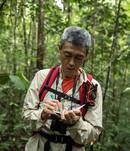Noticias
Towards innovative, conflict-sensitive and human rights-based approaches to forest monitoring
16/06/2020
16/06/2020

The Governments of Myanmar and Finland today launched a trailblazing project designed to allow for monitoring of forests in a manner that is sensitive to local conflicts and protects human rights.
The five-year project will be led by the Food and Agriculture Organization of the United Nations (FAO) thanks to a EUR 8 million endowment from the Government of Finland, a consistent partner in the promotion of environmental sustainability.
The project is innovative in taking a conflict sensitive and human rights-based approach to forest monitoring. This has global relevance as it will provide insights into how to bolster sustainable forests in other...

Ecosystem degradation negatively impacts the well-being of at least 3.2 billion people globally, with severe implications on global GDP. Investing in ecosystem restoration has been proven to support livelihoods, provide large-scale economic stimulus for national economies and make significant contributions to biodiversity. In March 2019, the UN General Assembly declared 2021 – 2030 the UN Decade on Ecosystem Restoration, aiming to restore degraded ecosystems on an unprecedented scale through a global restoration movement. The resolution highlights the major role restoration can play in achieving the objectives of the 2030 Agenda for Sustainable Development, as well as several environmental initiatives, including...

Forests underpin life on Earth. Globally, around 2.4 billion people or one-third of the entire human population depend directly on forests for wood for cooking their daily meals. And we all depend on forests in less tangible ways to provide the services that support life such as food, oxygen and pollination. Forested watersheds provide three-quarters of accessible freshwater, and forests can provide 30% of the greenhouse gas mitigation required by 2030 to keep global warming to below 2%. We need to find sustainable ways to manage forests, more urgently than ever, to nurture rather than undermine the life-supporting services that...

Forests play a pivotal role in combating climate change by absorbing and storing carbon from the atmosphere. Together with improved land management, forests and trees could provide up to 30 percent of the greenhouse gas mitigation required by 2030 to keep global warming to well below 2°C” (IPCC 2019). Forests, and forest monitoring in particular, are critical to ensuring that countries stay on target with emission reduction goals within the framework of the Paris Agreement.
For all the countries eager to generate reliable forest data, a sustainable National Forest Monitoring System (NFMS) needs to be put in place. A robust NFMS...

The scene of women carrying leaves from “In” trees, or Dipterocarpus tuberculatus, back to their villages is quite common in rural Myanmar. The leaves are collected in forests and used by villagers for roofing and wrapping materials. The timber is used for boats, rough furniture and firewood, and the oleoresin is used in torches, as well as in medicinal treatments. Forests in Myanmar have many uses and as the country moves forward with its REDD+ actions, putting safeguards in place has become a crucial step to ensure that traditional, sustainable uses of forests are not negatively affected.
To protect its forests...

